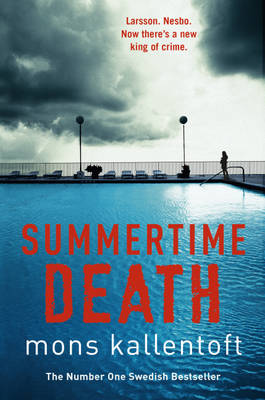
EURO CRIME
Reviews

Kallentoft, Mons - 'Summertime Death' (translated by Neil Smith)
Paperback: 496 pages (May 2012) Publisher: Hodder Paperbacks ISBN: 1444721577
The second in this seasonal quartet set in Linköping, south of Stockholm, is as hot as its predecessor, MIDWINTER SACRIFICE, was cold. Police detective Malin Fors is suffering in the sweltering temperatures, missing her daughter Tove who is on holiday in Bali with her ex-husband. Brooding over her parents - eternally absent and, Malin is convinced, keeping an important family secret from her - and without anything to do in her life outside work, Malin is abruptly awakened from her ennui by the discovery of a teenage girl in a children's park. The girl has been abused but is catatonic.
For the next 250 pages of this nearly 500-page novel, Malin and other colleagues desperately try to find out what happened to the girl, as well as search for another girl who has gone missing. This section of the book ends with the discovery of a body, buried near a municipal outdoor swimming pool. The pace picks up, as another young woman goes missing and the urgency increases.
SUMMERTIME DEATH is a well-constructed novel with an atmospheric, well-observed setting. Malin is the person who has to carry the book, and to a large extent she does, though the hints about her conflicts with her parents are repetitive and inconclusive (the reader can make an educated guess at the nature of the secret that she has sensed). The investigation itself is frustrating for a regular crime fiction reader as there is too much that the police omit to do. For example, they round up two young men who have been previously accused of rape, but don't investigate the others who were initially arrested with them. A bizarre clue emerges, but nobody thinks to investigate the only shop in town that sells such objects. The house and garden of one of the girls is not examined. People who had regular access to the girls' houses are not followed up. Not all these omissions turn out to be relevant, but when combined they make the book too drawn-out.
Most of the police are reasonable people, but one of them is not - yet his otherwise politically correct colleagues turn collective blind eyes when this man beats up more than one suspect to obtain information that verbal questions have not elicited. The narrative is interspersed with "dead victims speaking from the grave" segments, an unnecessary cliché (a device used previously, but less jarringly, by the author in MIDWINTER SACRIFICE).
The final scenes, while Malin works out who is responsible for the crimes and how they were carried out, are tense, but ultimately crazy in terms of psychological explanation, as well as featuring a heavily signalled, predictable victim. They also depend on Malin behaving in uncharacteristic ways, for example when she mishandles a press conference by volunteering two pieces of incendiary information, and her incredible insistence in not asking her colleagues for help in the final "race against time" sequences. There are certainly good things about the book, for example the character of a Serbian kiosk-owner and its portrait of small-town life, but as a crime novel it would have been better if shorter, without the supernatural elements, and less reliant on mistakes or accidents for its outcome.
Maxine Clarke, England
August 2012
Details of the author's other books with links to reviews can be found on the Books page.
More European crime fiction reviews can be found on the Reviews page.